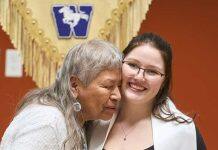

The University of Melbourne has attracted over $10 million in the latest National Health and Medical Research Council (NHMRC) funding round for Clinical Trials and Cohort Studies.
Four research groups were announced as recipients of the grant scheme designed to deliver better health treatments, policies, practices and outcomes.
Their research will focus on critical areas including preventing neonatal respiratory morbidity, preventing asthma and preserving lung function, and improving the health of First Nations people.
Dean of the Faculty of Medicine, Dentistry and Health Sciences, Professor Jane Gunn welcomed the announcement.
“This is a fantastic result, the work these groups are doing to advance health outcomes in the community is critical and I warmly congratulate them all,” Professor Gunn said.
“I am proud of the diversity represented in the groups who received the funding. It is fantastic to see acknowledgement of their important work and their contributions to the health of our communities, and particularly to see that two of these studies address gaps in Indigenous health.”
The NHMRC funded projects include:
- Associate Professor Joanne Said, Western Health – Prevention of neonatal respiratory morbidity with antenatal corticosteroids prior to elective caesarean section in women with diabetes
- Dr Danielle Wurzel, Melbourne School of Population and Global Health – Translatable evidence to improve lung health outcomes in First Nations people, a cohort study from birth to 6 years
- Professor Sandra Eades, University of Melbourne – The Next Generation Aboriginal Youth Cohort Study: Co-designing a strengths-based study to identify evidence-based, culturally strong, implementable strategies to improve youth health outcomes
- Associate Professor Adrian Lowe, Melbourne School of Population and Global Health – Testing an implementable strategy to improve infant skin barrier to prevent asthma and preserve lung function: a four-year follow-up of the existing PEBBLES Trial.
The University this week also officially launched the Australian Centre for Accelerating Diabetes Innovation (ACADI), its new national research centre aimed at improving health outcomes for young people with diabetes.
ACADI was established by MTPConnect’s Targeted Transition Research Accelerated (TTRA) program and was awarded $10 million over four years from the Australian Government’s Medical Research Future Fund (MRFF).
Led by University of Melbourne Associate Professor Elif Ekinci, ACADI is a strong collaboration of clinicians, researchers, industry and patient advocacy groups who will deliver new interventions for timely diagnosis, prevention and treatment of diabetes and its complications.
Philanthropist Susan Alberti has been named the inaugural Chair of the ACADI Council.
“Susan has made major contributions as a pioneer of the AWFL and as a philanthropist, her knowledge of this disease and its implications are profound. She lost her only child Danielle to complications of diabetic kidney disease when Danielle was only a young woman,” Associate Professor Ekinci said.
Mrs Alberti is an internationally-recognised advocate for people living with diabetes and is passionate about the future discoveries ACADI is poised to make.
“I am totally committed to providing leadership and support of the Centre by making certain our voices are heard and our discoveries are shared. I want to ensure other people don’t go on to develop the complications my daughter Danielle did. I do not want other families to lose a child to complications of diabetes at the prime of their lives,” Mrs Alberti said.







































